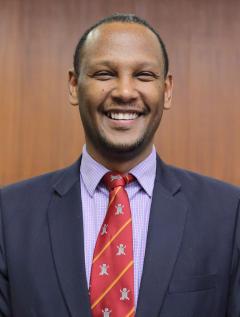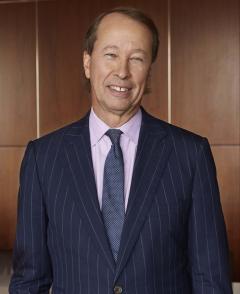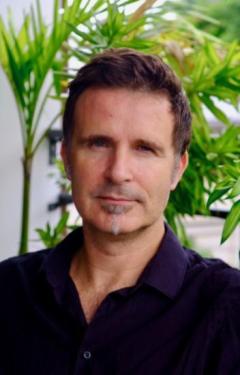President Bradley Hosts a Webinar on the Global Liberal Arts
Vassar recently hosted a three-part webinar titled “Innovation in Higher Education: Building Capacity for Inclusive Leadership” that featured conversations with people in the academic and business worlds whose backgrounds and experiences varied widely. But one common theme soon emerged: Transforming global society into a more equitable one will require today’s students to engage in a broad, liberal arts education. View videos from the webinar.

Panelists for the first segment, hosted by President Elizabeth H. Bradley and titled “Leadership in Higher Education,” were Sir Peter Mathieson, Principal and Vice-Chancellor of the University of Edinburgh and former President of the University of Hong Kong; Parag Saxena, a graduate of the Indian Institute of Technology (IIT) Bombay and co-founder of the investment firm Vedanta Capital; and Abebe Bekele, Deputy Vice Chancellor of Academic and Research Affaires and Dean of the School of Medicine at the University of Global Health Equity (UGHE).

Mathieson said the 440-year-old University of Edinburgh was undergoing its first comprehensive review of its curriculum in 70 years. “We’re asking ourselves, ‘What should every Edinburgh graduate know something about?’” he said. “And this is difficult because everybody wants to get their pet subject in. We’re number one in Europe on data science by everybody’s reckoning and competitive with some of the best North American universities in that particular subject area. We have a huge establishment of computer science research and whatnot. But we want to bring some of those data skills to students who might be studying music or history or medicine, or something else.”
Saxena said he believed excellent universities provided opportunities for students outside the classroom. “You can’t have [an entire college education] simply from classes,” he said. “In most universities, there are all kinds of clubs that have things like music, drama, and poetry. You’ll see other things that fill this vacuum that people really need.

“But in order to have a liberal arts program,” Saxena continued, “it’s got to be really excellent. Because for that highly competitive student that the university is seeking, to get the cream of the crop, to attract them, you’ve got to produce a really good program like at MIT, where students would be willing to go for economics or for other liberal arts. IIT would have to be at that level.”

Bekele said UGHE’s curriculum is based on the belief that “tomorrow’s doctors need to be prepared to handle tomorrow’s problems, not today’s problems. And COVID-19 has shown us that we need to probably go that way now in anticipation of what’s going to come soon. You’re looking at a doctor who is a communicator, who’s an expert in what he or she is doing, a professional, collaborator who understands partnerships, a leader who serves a role of a leader, a scholar, and a health advocate.
“Medical schools need to adapt and change their curriculum to address and produce such a professional at the end,” he said. “The liberal arts curriculum is about critical thinking, producing professionals who can ask the right question and come up with the right answer. It’s about communication, writing, listening, speaking, convincing, and advocacy. It’s about new ideas, new thinking.”
In the second segment of the webinar, Bradley engaged in a conversation with Hamilton “Tony” James, former President and Chief Operating Officer of the Blackstone Group and currently Chairman of Jefferson River Capital. James, a graduate of Harvard College and Harvard Business School, credited his background in the liberal arts with enabling him to achieve success in the financial world.
As an undergraduate who planned to pursue a business career, James said he believed that the best path to success would be to take as many quantitative courses as possible. He said he could not have been more wrong. “I did everything under my power at the time at Harvard to defeat [the liberal arts model] by taking every one of the most specialized, most advanced quantitative econometrics courses I could possibly take,” James said. “As it turned out, that was pretty much useless. And what I fell back on in my career that I found had a lot of utility were the other things that I had to take because I was forced to take because Harvard gave me a liberal arts degree even though I tried to not have a liberal arts education.”

He said a deep understanding of history is especially important. “Warren Buffet is constantly talking about what happened in the 14th century in China or something,” he said. “There’s no history that doesn’t have some relevance, I don’t believe. And you have to be able to write clearly and effectively and convincingly and you have to be able to speak clearly, effectively, and convincingly. And I think those are the basic foundations that you get from a liberal arts education.”
The third segment of the webinar, titled “Faculty and Student Reflections on the Liberal Arts,” was hosted by Vassar’s Deputy to the President, Wesley Dixon. Panelists were Dr. Denis Regnier, Head of Humanities and Social Sciences at UGHE; Dr. Sabine Rolle, Dean of Education in the College of Arts, Humanities and Social Sciences and a leader of the Edinburgh Futures Institute at the University of Edinburgh; Dr. Anurag Mehra, a member of the faculty of the Chemical Engineering Department at IIT who is currently teaching a course in data science at Vassar; Michele Tugade ’95, Vassar Professor of Psychological Science on the William R. Kenan Jr. Chair; and Linda Kim ’23, a Vassar senior who studied last year at the University of Edinburgh.

Regnier said those who developed the curriculum at UGHE recognize that while their students all want to become doctors, they have other interests as well that should be fostered. “They’re interested in literature, they’re interested in history, they want to do research, social science, psychology and all sort of things, so what we are giving them, they really appreciate,” he said. “What is important for them is to keep their intellectual curiosity. It’s important that they keep questioning things and asking the most interesting questions to their teachers, to their peers.”
Rolle, who is involved in revising the curriculum at the University of Edinburgh, said one of her goals is to engage a wide range of the faculty in the discussion. “Most of our faculty just talk among themselves and don’t really talk to wider people outside their discipline, outside their area,” she said. “I was keen and all the colleagues who were involved in building up the Edinburgh Futures Institute were really, really keen to make the university a bit more porous, to open up some avenues for people to come together to talk to each other across those boundaries, across those silos of discipline.”
Mehra agreed. “It’s high time that medicine and engineering education get to break out from the existing rigid structures they’re in right now and become more multidisciplinary,” he said. “I think collaboratives like this raise the status of a liberal multidisciplinary education and instill confidence in other people that it’s OK, you don’t have to study a single subject. That era is gone.

“We live in very tumultuous times,” Mehra continued. “Social awareness, empathy, and understanding of what’s going around in the world—with the kind of right-wing politics that we see everywhere, the misinformation—is absolutely important for professionals to be socially aware.”
Tugade said her experience teaching at UGHE had broadened her own perspective on pedagogy. “It gave me a chance and an opportunity to grow and to practice innovation and be experimental in how I teach,” she said. “To be given that opportunity was a gift, to really take that as some challenge for myself. I also did it to add a new dimension to my teaching. It helped me expand the viewpoints that I have about psychology and give me new tools and new, innovative pedagogical strategies for my classroom.”

Kim said she appreciated both the differences and the similarities between Vassar and the University of Edinburgh. “Having the liberal arts model at Vassar, I could take different courses without having restrictions,” she said. “And when I went to Edinburgh, the classes I took were mainly with freshmen, first years. And for them, their major was set on from the first year they went in to the university. There, I [experienced classes] in really big lecture halls and I’d never had that at Vassar. It was a very new experience, but there’s a tutorial system at Edinburgh that helped me to get a feel of an education model that felt similar to Vassar.”
As the webinar concluded, Bradley said she planned to continue the conversation by convening an in-person conference, probably in Edinburgh, with top administrators from the University of Edinburgh, UGHE, and IIT. Bradley noted that while the four institutions are very different in many ways, all four have “a lot of interest in thinking creatively about higher education and where it can go to solve global problems or to at least play in the field of addressing global challenges.”
“I think to myself often, ‘What are we going to get out of each other, working together in our institutions?’” she said. “And some of what you all have donated to this conversation, I think, is really the answer. One is dialogue. And it is so much more fun to dialogue with difference; that is, we’re all different from each other, we complement each other’s institutions, so we’re going to learn something.”
“And the other is creativity,” Bradley concluded. “I think both Peter and Abebe talked a lot about thinking outside the box. And I have visited all three of your institutions, and I’m eager for all of us to visit each other’s. But each time, I’ve come back with something that I really just had not seen before or a question one of you asked that I just had not been asked before.”